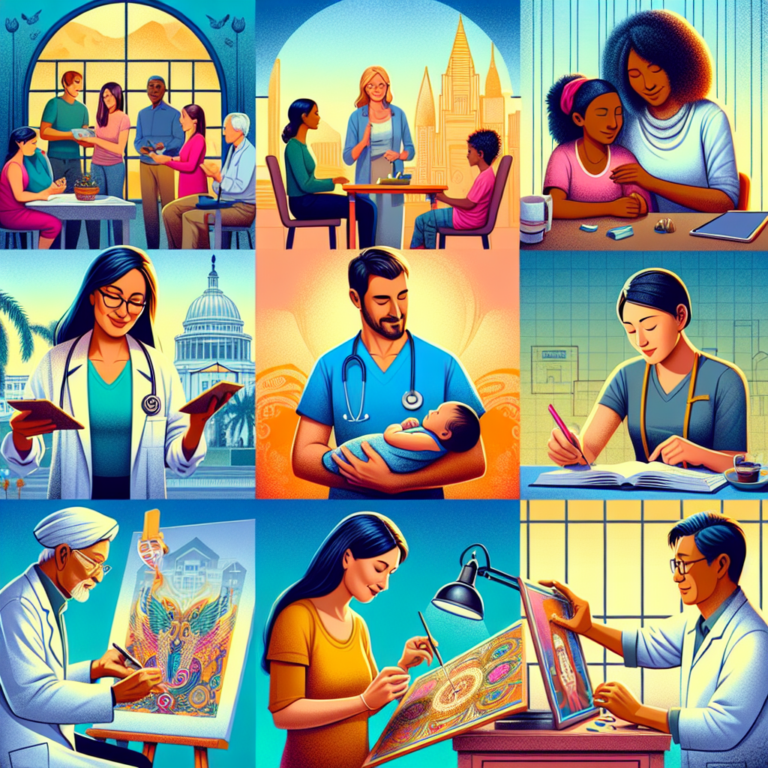As we continue to advance in technology, the conversation around artificial intelligence (AI) and its potential to disrupt the job market is more relevant than ever. However, not all professions are equally vulnerable to the changes brought about by AI. In fact, certain careers are uniquely positioned to remain resilient amid these shifting dynamics. Here, we explore the top seven careers that stand out as safe from AI disruption, showcasing the human touch, creativity, and complex problem-solving skills that make them irreplaceable.
1. Healthcare Professionals
The healthcare industry is one of the most robust fields that AI simply cannot replace. While AI technologies can assist with diagnosis and data analysis, the core essence of healthcare relies on human empathy, communication, and ethical judgment. Healthcare professionals such as doctors, nurses, and therapists engage intimately with patients, understanding their needs and emotions.
- Primary Care Physicians: These professionals bring personalized care to patients, requiring trust and rapport that AI cannot replicate.
- Mental Health Counselors: Therapists play a crucial role in providing therapeutic support, which relies on emotional intelligence.
2. Creative Professionals
Creativity is inherently human. While AI can assist with design and generate content based on algorithms, the innovation that stems from the human experience remains unmatched. Creative professions, such as artists, writers, and graphic designers, rely on original thinking, cultural context, and emotional resonance.
- Writers: Authors and content creators bring unique perspectives and storytelling abilities that AI cannot fully emulate.
- Visual Artists: Artists craft their work based on personal experiences and emotions, translating those into visual representations.
3. Skilled Trades and Craftsmanship
Skilled tradespeople possess a level of craftsmanship that requires years of training and hands-on experience. Professions such as electricians, plumbers, and carpenters demand a nuanced understanding of materials, techniques, and problem-solving in real-time scenarios.
- Electricians: Their work involves complex installations, maintenance, and customization that require skill beyond mere automation.
- Carpenters: Every project is unique, and the ability to customize solutions to fit specific space and design needs is essential.
4. Education and Teaching
Education is another field where human connection is paramount. Teachers and educators create learning environments that foster creativity, critical thinking, and performance. While AI can assist in personalizing learning experiences, it lacks the human engagement that motivates and inspires students.
- Teachers: They understand the diverse needs and learning styles of individual students, adapting their methods accordingly.
- Educational Counselors: These professionals guide students through their educational journeys, providing emotional and academic support.
5. Legal Professionals
The legal profession requires a deep understanding of human behavior, ethics, and the nuances of societal norms. Lawyers, judges, and mediators tap into critical thinking and interpersonal skills that are dynamic and complex – qualities that AI cannot replicate.
- Lawyers: They navigate legal systems, build client relationships, and provide strategic counsel based on their extensive training.
- Mediators: Their role in conflict resolution heavily relies on understanding emotions and navigating sensitive conversations.
6. Management and Human Resources
Management roles, particularly in human resources, benefit significantly from the ability to connect with people. Managers must inspire, motivate, and lead teams, which involves a combination of emotional intelligence and strategic foresight.
- HR Professionals: They deal with employee relations, conflict resolution, and fostering company culture, all of which require a personal touch.
- Project Managers: Successful projects rely on managing teams, resources, and timelines – a feat that is heavily reliant on human intuition and experience.
7. Social Work and Community Services
Social workers play an essential role in supporting individuals and families within communities. This career relies on empathy, strong communication skills, and understanding individual life circumstances, positioning social workers as indispensable in a digital world.
- Social Workers: They provide essential support to vulnerable populations, navigating complex social issues that require human insight.
- Community Organizers: These professionals build relationships and foster advocacy efforts, requiring a nuanced understanding of community needs and dynamics.
Adapting in a Changing Job Landscape
As we look forward, it’s crucial to recognize that while AI can enhance and streamline certain aspects of various professions, the human element remains irreplaceable. Jobs that require deep emotional connections, creativity, and complex problem-solving abilities are inherently resilient against the encroachment of AI.
To thrive in this evolving landscape, professionals should consider:
- Continual Learning: Engaging in lifelong education and skill development will keep professionals competitive.
- Networking: Building strong interpersonal relationships can create a supportive community that fosters collaboration.
- Emphasizing Unique Skills: Highlighting skills that are inherently human, such as communication and creativity, will position individuals favorably in the job market.
Rather than viewing AI as a threat, it’s beneficial to see it as a catalyst for change that will ultimately redefine and elevate the human experience in various careers. By embracing our unique qualities, we can continue to thrive in an era of rapid technological advancement.




0 Comments